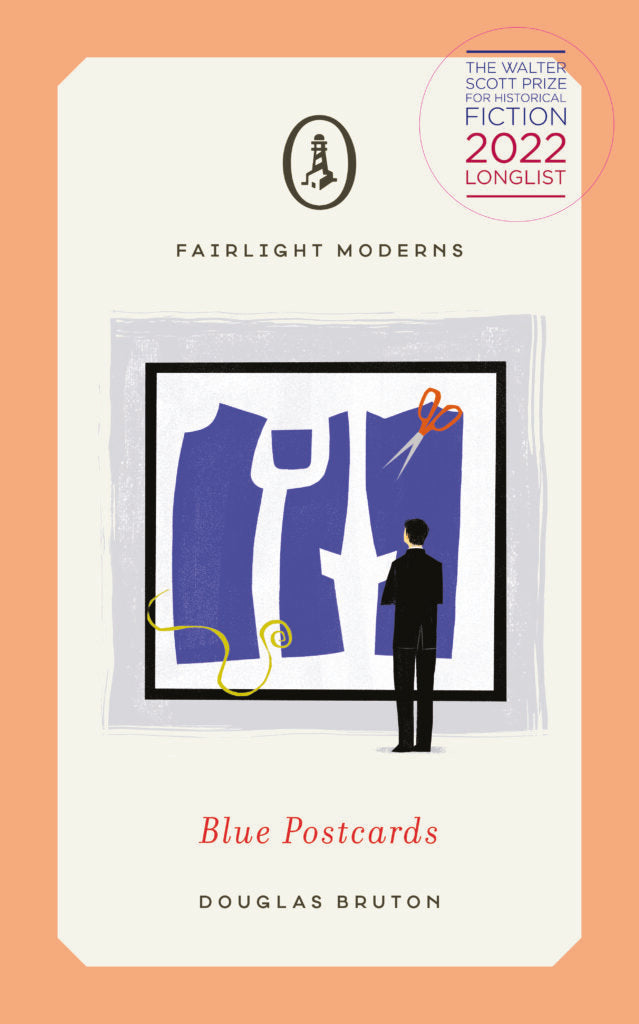1
/
of
1
Douglas Bruton
Blue Postcards
Blue Postcards
Regular price
$22.99 AUD
Regular price
Sale price
$22.99 AUD
Taxes included.
Shipping calculated at checkout.
Quantity
Couldn't load pickup availability
Longlisted for The Walter Scott Prize for Historical Fiction 2022
Sam's review
A few years ago, I can't remember exactly when, I picked up a small book from one of many trestle tables at a trade fair in the UK. It went into my bag, onto my shelves and sat there, unread, until March this year. I can't remember why I picked this book up , nor why I decided to read it so long after acquiring it.
Blue Postcards, by Scottish author Douglas Bruton begins with a similar scenario: a man browsing a trestle table, although in this case one situated below the Eiffel Tower. And, like me, he finds a hidden gem, "It was a blue postcard. Completely blue on one side, a blank and eternal blue...it had been franked and dated 14 May 1957. I do not think the girl serving at the stall knew what she had. It was priced at one euro". From here three interconnecting stories unfurl in a series of 500 postcard-length paragraphs, each one referencing the colour blue.
These postcards are jumbled, as collections of postcards generally are, and so our stories intertwine in a seemingly haphazard way. We read of Henri, the last tailor on a street where once there were many, who “writes all these measurements down in a leather-bound ledger that is kept locked in a safe as though it is a book of secrets”. We learn of Yves Klein, the artist, provocateur and publicist who invented a specific hue of blue and subverted conventional notions of art. And we follow our narrator and his elliptical relationship with the girl who sold him the postcard.
For the first few pages I struggled to make the connections between the paragraphs, let alone the stories. But slowly, like a painting taking form, the three tales took shape and the shared themes of love, loss, art and the “blue mists of memory” came into view. The blue mists of melancholy also linger throughout. Henri is upholding his family's tradition long after long after the events of Kristallnacht, the Night of Broken Glass, the 1938 pogrom carried out by the Nazis which destroyed Jewish businesses, synagogues and prayer rooms throughout Germany, Austria and the Sudetenland, and which destroyed Henri’s family as well. Yves Klein's creation of the blue that will take his name will also take his health. And our unreliable narrator's affection for the stallholder is questionable, possibly imaginary. As he himself asks, "And this thing with Michelle, who cannot yet be thirty, and a man who by his own admission was born on 14 May 1957, what is this thing? Is it a device, like a 'love interest' for this novel?"
While the unusual form of Blue Postcards might be difficult to navigate, I would urge you to persist. The writing is as sparse, elegant and clever as Yves Klein's artwork. The stories are as empathetic and touching as the postcards we find tucked in photo albums and old shoe boxes. Serendipity weaves its magic in moments like this. In the brief paragraphs of this book, it changes three lives that would otherwise have nothing in common. And, in drawing my hand to this book on that trestle table, it changed my life, in a small, beautiful, vividly blue way
Publisher Review
Once there was a street in Paris and it was called the Street of Tailors. This was years back, in the blue mists of memory.
Now it’s the 1950s and Henri is the last tailor on the street. With meticulous precision he takes the measurements of men and notes them down in his leather-bound ledger. He draws on the cloth with a blue chalk, cuts the pieces and sews them together. When the suit is done, Henri adds a finishing touch: a blue Tekhelet thread hidden in the trousers somewhere, for luck. One day, the renowned French artist Yves Klein walks into the shop, and orders a suit.
Set in Paris, this atmospheric tale delicately intertwines three connected narratives and timelines, interspersed with observations of the colour blue. It is a meditation on truth and lies, memory and time and thought. It is a leap of the imagination, a leap into the void.
Share


